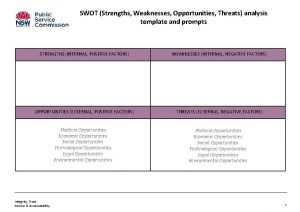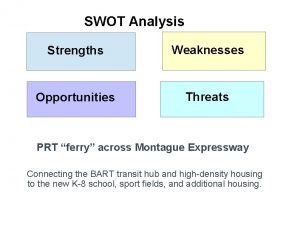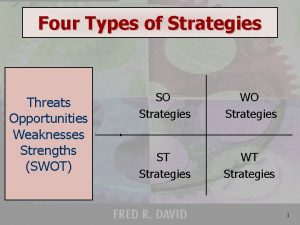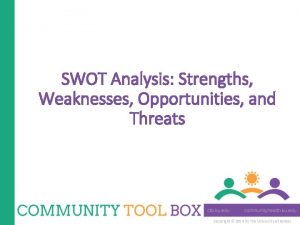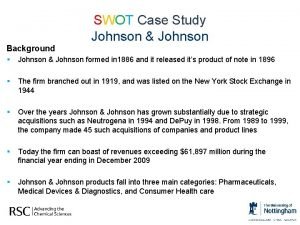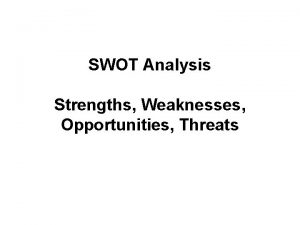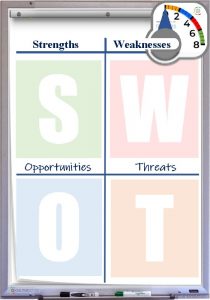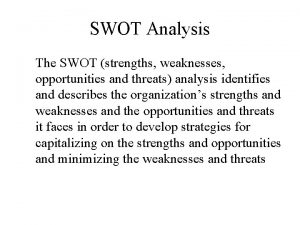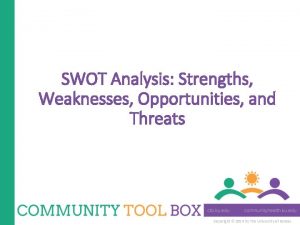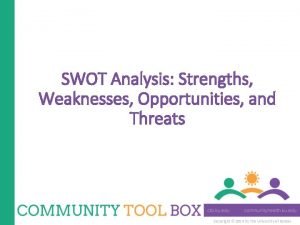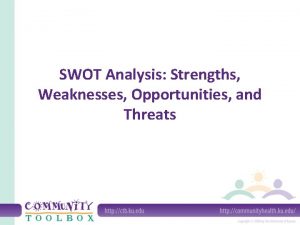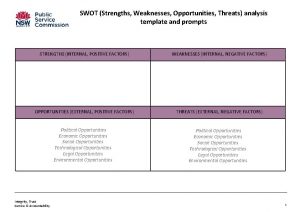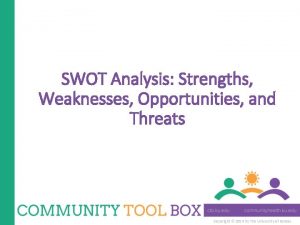SWOT Analysis Strengths Weaknesses Opportunities and Threats Overview















- Slides: 15

SWOT Analysis Strengths, Weaknesses, Opportunities, and Threats

Overview • A SWOT Analysis focuses on areas of concern and environmental factors that have the most impact during strategic processes and decisionmaking framework. SWOT analysis is a widely recognized method for gathering, structuring, presenting and reviewing extensive data collection during process planning. • A SWOT Analysis is a perfect opportunity for a division to see what units do best, and why, as well as identifying where areas of improvement are necessary through measurements of ideas and, or propositions.

Sample SWOT Analysis

Benefits of a SWOT Analysis • To identify where we are strong, and where we are weak • To provide “big picture” overview for contingency planning • To develop a “plan of action” to act on in a snapshot

Rules of a SWOT Analysis • Being realistic about the strengths and weaknesses • SWOT analysis should reflect future state, as well as where we would like to see division • Be specific • Avoid unnecessary over analysis


When do we use SWOT? • • • A SWOT analysis is often created during a planning session which allows for brainstorming and a more structured analysis. More organic results come from participants who have a positive attitude and look for possibilities. The tone of creating a SWOT analysis is typically done with collaboration and inclusivity.

More about SWOT • A SWOT analysis is a simple way to develop objectives and define “next steps. ” • A SWOT analysis is most useful when used to support the vision and mission of our strategic alignment efforts. • Understand how to substantiate the data gathered from an analysis and explain the findings. • A SWOT can help identify and prioritize results; support points and key findings

How to SWOT • • • A SWOT Analysis is a tool used to provide a general or detailed snapshot of organization, division and, or units health. It can be considered much like a tune-up, or periodic diagnostic of what has been worn, things that need repair, has broken down, or needs replacing All the elements that keep an organization running properly and in optimum condition

• A SWOT analysis focuses on the four elements of the acronym, although the format may vary depending on the complexity of the analysis. • The purpose of the SWOT is to explore positive forces that work together, as well as potential risk and external impacts which need to be addressed. • Internal factors – The strengths and weaknesses internal to the organization. • External factors – The opportunities and threats presented by the external environment to the organization. "Change is the law of life and those who look only to the past or present are certain to miss the future. " —John F. Kennedy

POSITIVE NEGATIVES Strengths Weaknesses Assets Limitations Resources Restrictions Opportunities Threats Possibilities Challenges

STRENTHS 1. 2. 3. WEAKENESSES 1. 2. 3. OPPORTUNITIES 1. 2. 3. 4. (OS) Strategies used to strengthen and take advantage of opportunities 1. 2. (OW) Strategies used to overcome weaknesses by using opportunities 1. 2. THREATS 1. 2. 3. 4. (TS) Maximize strengths and limit threats 1. 2. (TW) Strategies minimize weaknesses and avoid threats 1. 2.

Internal Factors: Strengths and Weaknesses (S, W) • Internal factors may include resources- Generally those areas are: • Staff, internal customers and stakeholders • Location, building, and equipment • Grants, funding agencies, and other streams of financial resources • Programs and internal systems

External Factors: Opportunities and Threats (O, T) • • • Forces and facts that we cannot control: Trends The economy Funding sources The physical environment (location) are we outgrowing our building, or are other factors impacting our location. • Legislation • National and local events

Knowledge is Power! • Understanding the positives and negatives will put us in a more powerful position to act instead of react. • The SWOT analysis is a piece that will support planning efforts; identifying issues that are opportunities for change. • Set or realign goals and objectives. • SWOT may assist in creating action plan, process and blueprint.
 Strength weakness opportunity threat template
Strength weakness opportunity threat template Strengths opportunities threats weaknesses
Strengths opportunities threats weaknesses Advantages of content analysis
Advantages of content analysis Wt strategies
Wt strategies Opportunities and threats of a bakery
Opportunities and threats of a bakery Swot analysis of a teacher
Swot analysis of a teacher Swot analysis of a teacher
Swot analysis of a teacher Example of threats of a person
Example of threats of a person Swot analysis of school
Swot analysis of school Johnson background
Johnson background Marks and spencer strengths and weaknesses
Marks and spencer strengths and weaknesses British strengths and weaknesses
British strengths and weaknesses Strengths of the confederacy
Strengths of the confederacy North and south strengths and weaknesses chart
North and south strengths and weaknesses chart Glanzer and cunitz strengths and weaknesses
Glanzer and cunitz strengths and weaknesses Mbti strengths and weaknesses
Mbti strengths and weaknesses
